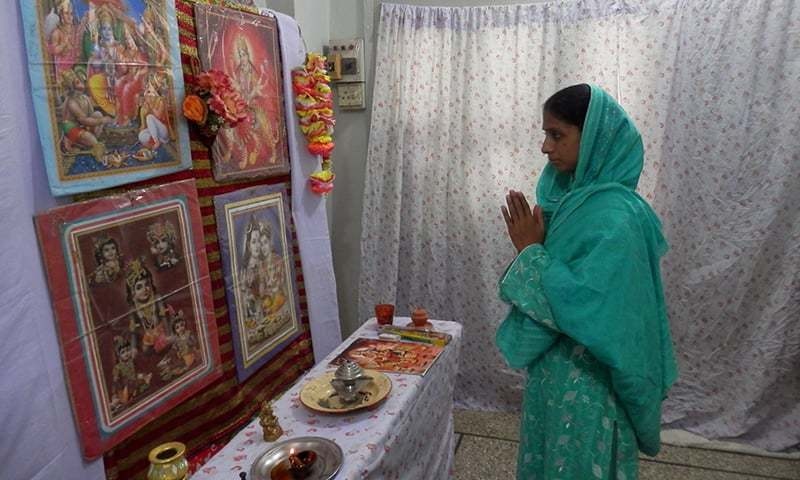Mithadar, the otherwise hustling and bustling district of Karachi, is submerged in tranquility on the weekends and other holidays. You can easily drive through the streets and arrive at your destination within a few minutes – something utterly unthinkable on weekdays, when even the local residents, commuting back from their workplaces, would dare not enter these overcrowding quarters before 8pm.
I am walking down the streets of Mithadar, looking for a Hindu temple that has been set up by a Muslim family in its house; not only set up but also fervently protected. Only a girl worships at this temple, all other members being Muslims.
The temple is in a room in which no one – whether a family member or outsider – can enter without removing his/her shoes. Anyone violating the rule is reproached by the lady of the house, saying, “Mister, first remove your shoes! Or my daughter will take offence.”
The lady of the house, Bilquis Edhi, is the wife of Abdul Sattar Edhi, who is known everywhere in Pakistan for his humanitarian work. If Abdul Sattar Edhi is the godfather of charity-services in the country, Bilquis is the godmother in her own right.
Both Bilquis and her husband are practicing Muslims. In the 1970s, they travelled by road to Mecca for the Hajj pilgrimage. Why would such a devoted Muslim couple setup a temple in their house?
I put the question to Bilquis Edhi. She smiles and says:
“I had this temple built for Geeta. Geeta, you know ... she came to us from the Lahore border, 11 years ago. And her age ... she was only 11 years old back then. She suffers from hearing and speech impairment.
“When she came here, it was clear from her actions that she was not a Muslim. She would touch her forehead with her hand as if she were placing a tilak (a religious mark worn by Hindus) there. Then, in the same manner, she would perform Aarti (a ritual of worship) by moving her hands in the air. That made it clear to me that she was a Hindu, not a Muslim. So I had a temple built on the third floor of the Edhi Foundation Building.
“Now, she goes to the temple daily and performs puja. She also talks to me by hand gestures. I have thought about marrying her off here in Pakistan. But whenever I suggest this to her by making the sign for the Sindoor-Dana ceremony, she waves it away. Then, she raises her hand high to gesture for a plane to India, and then she acts out the Sindoor ceremony and the pheras [The seven rounds taken by bride and groom around fire at Hindu weddings].
 |
| Geeta performing puja in the temple-room. —Akhtar Balouch |
“We have contacted the Indians, but people at their embassy (the Indian High Commission) say that the girl will land in jail if she goes to India. I am trying to find her a suitable husband here in Pakistan, but she does not consent to it.”
I was still in conversation with Bilquis Edhi, when her youngest son Faisal Edhi interrupted me, “Akhtar, the Indian fishermen freed by Pakistan are to leave from Karachi at 2 o’clock.”
He instructed an Edhi volunteer to prepare money-envelopes for the fishermen with Rs 5,000 in each. I was bemused by his alacrity, “Yaar, its only 12:30. We are still hours away from 2pm.”
Faisal replied, “There are 163 people and everyone is to get a money envelop. Now, if we spend one minute on each of them, it takes three hours to accomplish the task.”
However, I persuaded him to stay, albeit for a short time, and give me a tour of the third floor, where Geeta’s temple is located.
Climbing up the stairs, Faisal said, “The recent Bollywood movie Bajrangi Bhaijaan is based on this same Geeta’s story.”
“How come?” I asked.
Faisal Edhi told me that he had been in contact with several governmental and non-governmental organisations of India for a long time now. He informed them about Geeta in his quest to locate her parents or relatives, but to no avail.
Somehow, he said, the story was picked from these organisations by the Indian film industry people, who turned it into the movie. The real character of the story is still in Pakistan as Geeta. According to Faisal, some ‘social-workers’ had even tried to exploit Geeta’s story for personal fame.
 |
| The barefoot entry rule is strictly implemented. —Mohsin Soomro |
Meanwhile, Bilquis Edhi revealed that Geeta also performs Namaz (or Salat, the Muslim ritual of prayers), which she had learnt by imitating other girls and women living at the Edhi Foundation Building. A majority of them are Muslims and pray five times a day, and so Geeta, too, started offering Namaz besides her daily Puja in her temple. Other girls and women, Mrs Edhi told me, are respectful to her temple.
Then she added in a melancholic tone: “Now, she has grown up. I want to marry her off here. But what can I do? I am the only one who understands her language (of signs). She often suggests that her father is a very rich Indian, and so, she would go to India on an airplane. The discussion on her future with the Indian officials is still underway. But I wonder what they are going to decide: Will my child will live here, in Pakistan, or there, in India?”
With a heavy heart, I climbed down the stairs to leave the Edhi Foundation Building. Geeta’s was a heart-wrenching story; I continued to reflect on her ordeal for a long time. Then, it suddenly occurred to me that there could be scores of Geetas and real-life Munnis on both sides of the border, waiting for people like Bilquis Edhi, who would strive to unite them with their families, rather than just make movies on them.
Geeta’s situation is not something that can be taken for granted. Before my visit to the Edhi Foundation Building to interview Geeta and Mrs Edhi, I had gone there to meet Faisal Edhi and had had a brief encounter with Geeta. I had come to conclusion that it would take some time before I could write about her.
Finally, after a few days when I met her for the interview, she smiled, made a circle on her forehead with the index finger of her right hand, and then palmed her face very briefly, as her eyes met those of a Balouch girl standing nearby.
I understood that I was the subject of their voiceless conversation. I asked the Balouch girl, “What is Geeta saying about me?”
The girl laughed and said, “She is saying, ‘He’s come again!’”
Then, Geeta touched her shin and made another sign, which was translated by the same girl when I asked her. She said, “Geeta says that she has climbed up and down the stairs so many times that her feet are hurting now.”
The girl told me that ever since Geeta’s story has hit the news in recent days, TV and newspaper journalists were frequenting the Edhi Foundation Building, and Geeta was asked to come down from the third floor, every time a new troupe of reporters arrived.
 |
| The author with Abdul Sattar Edhi. —Mohsin Soomro |
On the same occasion, I met with Abdul Sattar Edhi; he looked fresh and relaxed. When I enquired about his health, he smiled and said, “I have grown into a 100-year-old man. But everything is fine.”
He then whispered something in Faisal’s ear. I asked him what it was. Faisal chuckled and said, “He's asking what has brought Anwar Maqsood here.”
—Translated by Arif Anjum from the original in Urdu here.
Related:















































